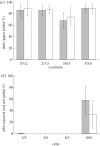Theft in an ultimatum game: chimpanzees and bonobos are insensitive to unfairness
- PMID: 22896269
- PMCID: PMC3497113
- DOI: 10.1098/rsbl.2012.0519
Theft in an ultimatum game: chimpanzees and bonobos are insensitive to unfairness
Abstract
Humans, but not chimpanzees, punish unfair offers in ultimatum games, suggesting that fairness concerns evolved sometime after the split between the lineages that gave rise to Homo and Pan. However, nothing is known about fairness concerns in the other Pan species, bonobos. Furthermore, apes do not typically offer food to others, but they do react against theft. We presented a novel game, the ultimatum theft game, to both of our closest living relatives. Bonobos and chimpanzee 'proposers' consistently stole food from the responders' portions, but the responders did not reject any non-zero offer. These results support the interpretation that the human sense of fairness is a derived trait.
Figures


Similar articles
-
Chimpanzees and bonobos use social leverage in an ultimatum game.Proc Biol Sci. 2021 Nov 10;288(1962):20211937. doi: 10.1098/rspb.2021.1937. Epub 2021 Nov 3. Proc Biol Sci. 2021. PMID: 34727713 Free PMC article.
-
Chimpanzees are rational maximizers in an ultimatum game.Science. 2007 Oct 5;318(5847):107-9. doi: 10.1126/science.1145850. Science. 2007. PMID: 17916736
-
A Comparison Between Bonobos and Chimpanzees: A Review and Update.Evol Anthropol. 2016 Sep;25(5):239-252. doi: 10.1002/evan.21501. Evol Anthropol. 2016. PMID: 27753219 Review.
-
Bargaining in chimpanzees (Pan troglodytes): The effect of cost, amount of gift, reciprocity, and communication.J Comp Psychol. 2019 Nov;133(4):542-550. doi: 10.1037/com0000189. Epub 2019 Jun 27. J Comp Psychol. 2019. PMID: 31246048
-
The expression of empathy in human's closest relatives, bonobos and chimpanzees: current and future directions.Biol Rev Camb Philos Soc. 2024 Aug;99(4):1556-1575. doi: 10.1111/brv.13080. Epub 2024 Apr 10. Biol Rev Camb Philos Soc. 2024. PMID: 38597291 Review.
Cited by
-
Comparative economics: how studying other primates helps us better understand the evolution of our own economic decision making.Philos Trans R Soc Lond B Biol Sci. 2023 May 8;378(1876):20210497. doi: 10.1098/rstb.2021.0497. Epub 2023 Mar 20. Philos Trans R Soc Lond B Biol Sci. 2023. PMID: 36934757 Free PMC article. Review.
-
Bonobos respond aversively to unequal reward distributions.Proc Biol Sci. 2025 Apr;292(2045):20242873. doi: 10.1098/rspb.2024.2873. Epub 2025 Apr 16. Proc Biol Sci. 2025. PMID: 40237076 Free PMC article.
-
Fairness in the multi-proposer-multi-responder ultimatum game.PLoS One. 2025 Mar 4;20(3):e0319178. doi: 10.1371/journal.pone.0319178. eCollection 2025. PLoS One. 2025. PMID: 40036219 Free PMC article.
-
Competitive and cooperative games for probing the neural basis of social decision-making in animals.Neurosci Biobehav Rev. 2023 Jun;149:105158. doi: 10.1016/j.neubiorev.2023.105158. Epub 2023 Apr 4. Neurosci Biobehav Rev. 2023. PMID: 37019249 Free PMC article. Review.
-
Evolution of egalitarian social norm by resource management.PLoS One. 2020 Jan 30;15(1):e0227902. doi: 10.1371/journal.pone.0227902. eCollection 2020. PLoS One. 2020. PMID: 31999744 Free PMC article.
References
-
- Fehr E., Fischbacher U. 2003. The nature of human altruism. Nature 425, 785–79110.1038/nature02043 (doi:10.1038/nature02043) - DOI - DOI - PubMed
-
- Brosnan S. F., de Waal F. B. M. 2003. Monkeys reject unequal pay. Nature 425, 297–29910.1038/nature01963 (doi:10.1038/nature01963) - DOI - DOI - PubMed
-
- Brosnan S. F., Schiff H. C., de Waal F. B. M. 2005. Tolerance for inequity may increase with social closeness in chimpanzees. Proc. R. Soc. B 272, 253–25810.1098/rspb.2004.2947 (doi:10.1098/rspb.2004.2947) - DOI - DOI - PMC - PubMed
-
- Bräuer J., Call J., Tomasello M. 2006. Are apes really inequity averse? Proc. R. Soc. B 273, 3123–312810.1098/rspb.2006.3693 (doi:10.1098/rspb.2006.3693) - DOI - DOI - PMC - PubMed
-
- Bräuer J., Call J., Tomasello M. 2009. Are apes inequity averse? New data on the token-exchange paradigm. Am. J. Primatol. 71, 175–18110.1002/ajp.20639 (doi:10.1002/ajp.20639) - DOI - DOI - PubMed
Publication types
MeSH terms
LinkOut - more resources
Full Text Sources

